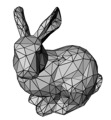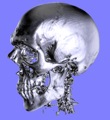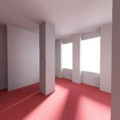
News
Youtube Channel CG
Seminar Computer Graphics



In the first seminar meeting, the final assignment of topics will take place, and the seminar rules and requirements will be explained.
Please contact Martin Lambers beforehand if you have questions about the topics or if you are interested in a particular topic.
Goals:
Participants of the seminar learn and practice to independently inform themselves about a scientific topic (here in the context of computer graphics), and to present and communicate that topic to a larger audience.
For this purpose, every participant is given a scientific paper, typically published in conference proceedings or in a journal. The contents of this paper need to be presented and communicated to the other seminar participants by means of a report and a presentation. For this purpose, additional sources are usually required, as well as selfmade material such as illustrations.
The seminar is open for both bachelor and master students. The formal requirements are identical, but the content of the scientific paper will vary: bachelor students will typically be given topics that are suitable as followups to Computer Graphics I, while master students will typically be given more advanced topics from current research. Furthermore, the focus for bachelor students is to learn the basic techniques and requirements of scientific writing and presentation, while master students will need to give more attention to aspects such as clarity, expression, and style.
Requirements:
The successfull participation requires:
- Presence at all presentations (missing a presentation without plausible reason will terminate participation)
- Preparation of a presentation (e.g. PDF, Powerpoint, HTML)
- Free presentation of 30 minutes, with a subsequent discussion about both contents and style of the presentation
-
Report about the topic (4500-8000 words, produced with LaTeX), to be handed in before the presentation
Material:
Topics
| Topics for Bachelor students | Link | Date | Student | Supervisor |
| Perfect spatial hashing | Paper | 20.05. 14:15 | M. Wagner | R. Winchenbach |
| Dynamic Bounding Volume Hierarchies | Paper | 20.05. 15:00 | F. Falkenhain | M. Lambers |
| Volumetric Clouds | Paper | 27.05. 14:15 | J. Wodrazka | R. Winchenbach |
| Texture Mapping Based on Projection and Viewpoints | Paper | 27.05. 15:00 | R. Neznamov | D. Presnov |
| Image Denoising based on non-local means | Paper | 03.06. 14:15 | A. Pröbsting | M. Lambers |
| QSplat: Point Rendering | Paper | 03.06. 15:00 | M. Neef | M. Kluge |
| NICP: Dense normal based point cloud registration | Paper | 17.06. 14:15 | K.C. Kreps | M. Kluge |
| Multi-layer depth peeling via fragment sort | Paper | 17.06. 15:00 | M. Jüngst | D. Presnov |
| Fast bilateral filtering for the display of HDR images | Paper | 24.06. 14:15 | H. Natusch | M. Lambers |
| Exact calculation of the overlap of spheres and mesh elements | Paper | 24.06. 15:00 | J. Huyghe | R. Winchenbach |
| Photo Zoom: High Resolution from Unordered Image Collections | Paper | 01.07. 14:15 | P. Lückel | M. Kluge |
| Cutaways for Comprehensible Rendering | Paper | 01.07. 15:00 | M. Brilka | D. Presnov |
| Topics for Master students | Link | Date | Student | Supervisor |
| Painterly Rendering | Paper | 08.07. 14:15 | R. Häbel | T. Wong |
| Surface rendering for particle-based fluids | Paper | 08.07. 15:00 | K.D. Holighaus | R. Akhunov |

